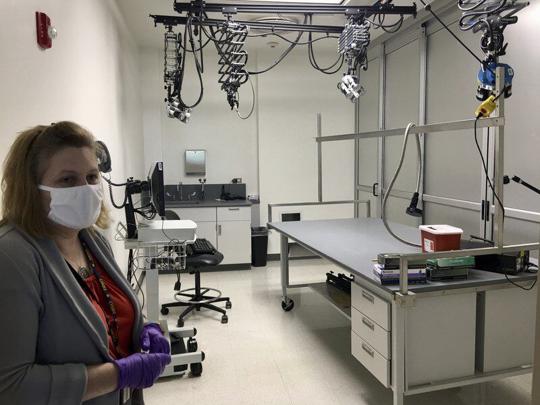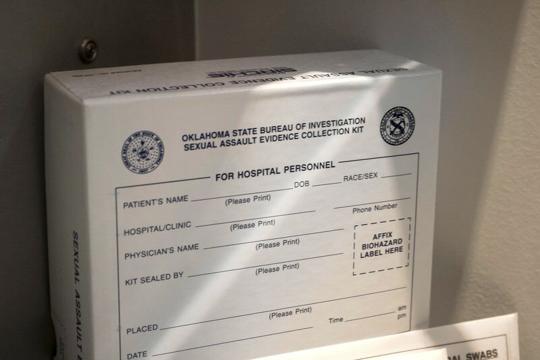Sexual Assault Nurse Examinations a Key Tool in Gathering Evidence
EDMOND – Stillwater Medical Center averages 40 Sexual Assault Nurse Examinations a year.
Heidi Gilbert, a sexual assault nurse examiner at SMC, said as of December 10th of 2020, there have been 43 examinations.
A victim who was sexually assaulted can get a sexual assault examination done without being required to report the assault to authorities.
The importance of these kits is to preserve evidence as quickly as possible in case a victim later decides to report, she explained.
The Rape Kit Process
Protocols are in place to quickly administer rape examinations while considering the trauma the victim has gone through.
“On presentation to the emergency department, the patient is checked in by the registration clerk, a triage nurse takes vital signs and escorts the patient to a private waiting area. SMC has SANE Nurses on call 24/7. Sometimes they may already be on duty and others, they are called in from home,” Gilbert said.
Women who choose to get a SANE exam are first given an explanation of what the exam is.
This is offered at no charge, regardless of if a victim wants to report the assault.
“The nurse first performs a head-to-toe assessment looking for, documenting, and photographing any injuries or areas of pain,” Gilbert said. “It is important to note that the primary reason for an exam is to rule out any serious injuries, administer post-exposure prophylactic medications and connect the patient to important resources such as counseling.”
Evidence is collected should they want to pursue criminal charges.
The sexual assault evidence collection kits are all sent to the Oklahoma State Bureau of Investigations and are standardized across the state.
“There are several steps: two different oral swabs, genital swabs (internal and external for females), external anal swabs and collection of clothing if worn during the assault. Additional swabs from other body parts may be collected dependent on the events surrounding the assault,” Gilbert said. “For females, the exam includes a speculum pelvic exam very similar to that from a routine gynecologist visit. Blood and urine may be collected if drug facilitation is suspected.”
Gilbert said the only test SMC processes itself is a pregnancy test.
At the conclusion of the exam, the kits are given to law enforcement and then are given to OSBI.
“If the patient wishes to remain anonymous, no identifying information is included on the kit given to law enforcement, but rather a ‘SANE number’ (i.e. SANE 659) that can be connected to that patient by the SANE nurse or SANE coordinator should they choose to report at a later date,” Gilbert said.
Stillwater Detective Mary Kellison said it isn’t uncommon for victims to get a SANE examination but choose to not report to law enforcement.
“It takes a while for the brain to process traumatic events,” she said. “Traumatic events overwhelm the ordinary care systems that give people a sense of control, connection, and meaning.”

Michelle Charles/Stillwater News Press Misti Burris, an OSBI criminalist, gives a tour of an examination room in OSBI's Edmond Forensic Science Center.
Benefits of Getting a SANE Examination
Assistant District Attorney Debra Vincent said a sexual assault nurse examiner may be hearing the story from the victim for the first time. The nurses are documenting the victim's demeanor as well as their injuries.
“From a prosecutor’s standpoint, it's still really helpful to go have a rape exam because you have a trained nurse who’s collecting evidence, but more than that they’re hearing the story told. They’re documenting it as maybe the first time it’s told in full. They’re observing the demeanor of the person,” she said.
Gilbert said her No. 1 job is to create an atmosphere where the patient feels heard and safe.
She also said patients want to make sure they are physically OK.
A benefit that comes from a SANE examination range from getting a pregnancy test to checking for sexually transmitted diseases.
“It may be too much to report to law enforcement just after the assault. It’s important to get checked out, get those post-exposure medications and collect time-sensitive evidence, should they choose to report later,” Gilbert said.
Why might a victim choose not to get a forensic exam?
Someone who was recently violated may struggle with a decision to go ahead with a forensic examination for a number of reasons.
Both Gilbert and Kellison said the brain doesn’t process things normally when trauma has occurred.
Many victims may feel guilt or shame, according to Gilbert.
“It may also be physically painful to have an exam done after an assault. We’re not here to retraumatize any victim. While any sort of exam like this isn’t necessarily comfortable, if we’re causing pain, we’re going to stop what we’re doing,” Gilbert said.
Misconceptions of Forensic Examinations
Gilbert said a common misconception is they have to “report to law enforcement,” which is untrue.
Although law enforcement does often get involved, they are only involved when the patient asks for them.
She also mentioned underage victims who come in and had been drinking alcohol before, during or after their assault.
They may be worried if police become involved, they could get in trouble for consuming alcohol when underage.
“Our underage, high school and college students are often worried about legal repercussions for drinking underage if they report a rape. I can tell you that law enforcement isn’t concerned about that if someone is sexually assaulted,” Gilbert said.
Another misconception regarding sexual assault examinations is that a woman will present injuries to her body if she was assaulted.
This may be true for some victims, but most victims’ genitalia have no injuries.
“Lack of trauma, doesn’t mean an assault didn’t occur. On average, since 2015, only 27% of our cases had identifiable genital trauma,” Gilbert said.
District Attorney Laura Austin Thomas agreed with Gilbert’s statement.
“You also have to remember on rape kits and SANE exams, it’s not uncommon to not find anything, but that doesn’t mean they weren’t raped,” Thomas said.
There are many misconceptions for sexual assault examinations that Gilbert mentioned. Some were widely known while others weren’t.
Gilbert can’t determine what drugs were used when a patient arrives to get an examination.
While SMC can test for alcohol in the blood, there are far too many drugs that are facilitated with date rape to test for all of them, she said.
“We also can’t tell a patient what drug they may have been slipped. There is a vast array of drugs used to facilitate sexual assaults, and some metabolize very quickly. The blood and urine collected is sent to the OSBI lab with the knowledge, expertise and equipment to test for those. We do not do that testing in our hospital,” she said.

Ashlynd Huffman/Stillwater News Press The OSBI sexual assault evidence collection box is known by many as a rape kit.
Where do the kits go?
The SANE kits or rape kits are picked up by law enforcement and sent to the Oklahoma State Bureau of Investigation lab to be tested.
OSBI tests all the kits in Oklahoma excluding Oklahoma City and Tulsa because they have their own lab.
The kits are tested by biologists who check for seminal fluid and check for any male DNA.
Due to a recent law that required all sexual assault kits to be sent to a forensic lab, OSBI has had its hands full with more kits in the last year than they are used to.
Backlogged Kits and the Sexual Assault Kit Initiative (SAKI) Project
Criminalist Administrator Mistie Burris at OSBI said the Attorney General’s Office received a grant and they partnered with OSBI to help get the untested kits tested.
The Attorney General’s Office received $2,398,302 in SAKI funding in 2019 to create a multidisciplinary team to help guide the project.
As of now, OSBI has around 3,500 untested kits that will need to be outsourced to other labs.
“So, because of staffing, if we were able to have as many biologists as we could, we would not outsource, we would do them ourselves,” OSBI Public Information Officer Brook Arbeitman said.
OSBI has hired more biologists, but they are currently in training, which can take over two years.
“They offered to pay for certain markets this year. And it's like she said if we had more manpower, they could be work here. We just can't seem to keep up with current pieces,” Burris said. “So, we'll be sending those to an outsource lab that meets all the same standards we do that we've checked out and then we'll get those.”
Investigators may gather evidence besides the sexual assault kit, but the kit is tested before other evidence.
“The SAKI project is focused on the kits and a lot of cases do have that, but what we try to do is work the kit, first, because our kit is positive and we've got a DNA profile on the suspect, there may be no reason to test all that,” Burris said.
What happens to the kits after they are tested?
After the kits are tested, they are returned to law enforcement and kept at the agency it came from for 50 years, which is also a fairly new law.
“The statute has changed; they must keep kits for 50 years from the date of offense, or the statute of limitations, whichever is longer. So, I generally say you're keeping it for 50 years,” Burris said.
Before 2019, there wasn’t a law that determined a length of time a kit had to be kept.
Law enforcement could discard the kits if they needed more space in the property room, or if the District Attorney’s Office declined to prosecute.
“Well and you also have, you know, when the new sheriff comes in and he doesn't know anything about that case and his property room is full,” Burris said. “You have kits that the person didn't report it's an anonymous kit and they're looking at it going, ‘why am I saving this anonymous kit.’ And there's no victim name attached to it. That's why we got a new statute last year, that they should be held for 50 years.”
Tracking Sexual Assault Kits
Survivors of sexual assault are now able to track the progress of their kits. They are able to do this anonymously.
This system was designed, so survivors could track their untested kits to help give them information and to assist law enforcement.
Arbeitman said the ultimate goal is for those who survived sexual assault to get answers.
Original article by Stillwater News Press.